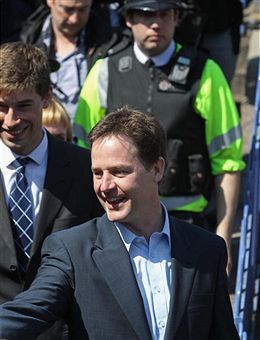 One thing’s for certain: the Lib Dems are coming in for greater scrutiny and attention
from the media. The covers of the Telegraph, Sun, Mail, Express and, yes, The Spectator are testament to that – even if some are less substantial than others. But the question is: will
this derail the Clegg bandwagon? And, like Iain Dale, I’m not so sure.
One thing’s for certain: the Lib Dems are coming in for greater scrutiny and attention
from the media. The covers of the Telegraph, Sun, Mail, Express and, yes, The Spectator are testament to that – even if some are less substantial than others. But the question is: will
this derail the Clegg bandwagon? And, like Iain Dale, I’m not so sure.
Iain’s point is that some of the coverage is so spiteful that it will “serve to increase his popularity and position in the polls”. He adds that this would be a “sure sign that the power of the press to influence an election is on the wane”. He’s right, and the theme he identifies is one of the major currents that’s swirling about underneath the surface of this election campaign. It might yet turn out to be a tidal shift.
The clearest signs of this, so far, have come in the last couple of months. The Brown bullying, Lord Ascroft and Unite stories electrified the political classes, but did they shift the polls? Did they sway hearts and minds? Not in any clearly discernable way, they didn’t. And why? Well, that’s the $64,000 dollar question. My guess, as I’ve written before, is that the public regarded them as all too Westminster-centric. They saw them as conflicts arranged and prolonged by SpAds, press officers and journalists – rather than something that matters to their everyday lives.
And this is why what happens to Clegg is so interesting from a media perspective. He may not be the tribune of change that he sells himself as, but people clearly regard him as such. And if those same people are left unmoved by all the newspaper coverage, then what does that say about their respect for the traditional media? Are the column inches simply being ignored? Or, worse, are newspapers being lumped in with all those politicians whom voters are so keen to strike out at?
This isn’t to say that the media shouldn’t scrutinise Nick Clegg – far from it. But there’s a danger that this will be regarded – rightly or wrongly – as poltical journalists protecting their own. In the end, the real worry for newspapers and magazines is that they’re all seen as part of an old order – and are treated as such.






Comments